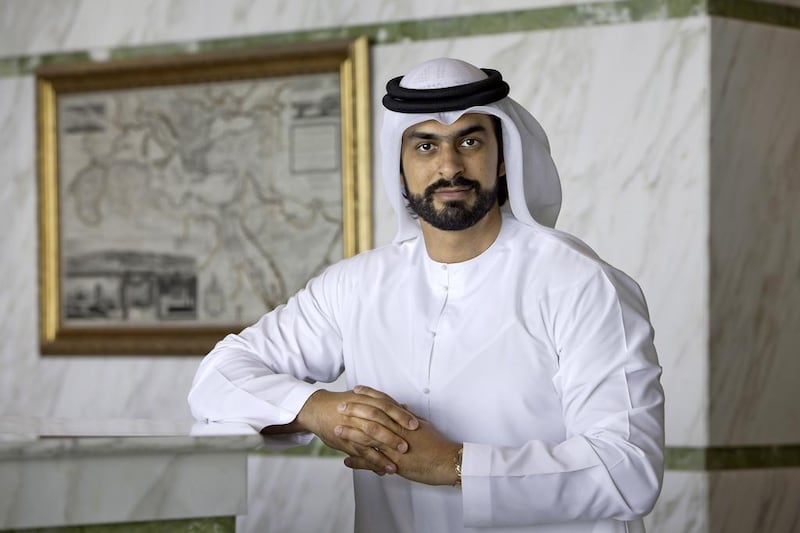With initial public offerings being planned or considered by so many corporate organisations in the UAE, and especially the big family businesses that play such an important role in the country’s economy, it is refreshing to hear this:
“We have no thoughts of an IPO, and will not issue any bonds. I say, if you don’t need it, avoid it. Be content with what you have and be patient.”
The speaker is Abdulla Al Gurg, the group general manager of the family conglomerate Easa Saleh Al Gurg, which over the past 60 years has carved out a place in the UAE corporate infrastructure. It has done so in a low-key, understated way compared with some of the headline grabbing activities of other family groups.
Al Gurg is perhaps the most “family” of the big family conglomerates. Mr Al Gurg is the third generation to be “integrated into the company”, as he describes it. He tells how his grandfather, the eponymous Easa Saleh, who is still chairman at a ripe old age that nobody apparently knows, lay the foundations of the business in the 1960s.
“He was a right-hand man to Sheikh Rashid bin Saeed Al Maktoum [who ruled Dubai at the time of the UAE’s formation] and was one of the few Arabs who spoke English back then. He acted as interpreter between the ruler and the British political agent. He also worked for the British Bank of the Middle East (now part of HSBC), and so the bank partnered with Sheikh Rashid as a result,” says Mr Al Gurg.
That relationship – between Dubai’s ruling family, the banking industry and the Al Gurgs – was the foundation for what has become today a multibillion dirham conglomerate, with 18 subsidiary companies, five major joint ventures with global partners and operations in 22 countries.
Its Dubai headquarters – in sight of the dhow wharves that were the source of the emirate’s first trading boom in the 1970s – is the centre of an operation that has interests in construction, consumer products, industry, property and retail and lifestyle.
Among its partners in some 360 joint ventures and agency agreements are such global brands as Siemens, Osram, British American Tobacco, Unilever and Benetton.
“But in most businesses Al Gurg is usually the subcontractor rather than the main contractor, so therefore we’re at different parts of the value chain. We are involved in Dubai infrastructure building, as well as at the consumer and retailer level,” says Mr Al Gurg.
After an education in the UAE and America and some time as a civil servant, he worked for the property arm of Dubai Holding, the conglomerate-owned conglomerate, on such projects as the Tiger Woods development, Dubailand and Tatweer.
This experience puts him in a good position to comment on the sustainability of Dubai’s current phase of economic boom.
“Dubai has done two things that I believe will ensure the recovery will be sustainable. First, it has tightened the property resale laws to reduce property speculation and flipping. And second it has controlled rents more efficiently via the Rera capping laws. I do not see anything major on the macroeconomic side that will derail us in the run up to Expo 2020,” he says.
In property, Al Gurg group is a major investor in Dubai and elsewhere, but with a difference. “We have never sold a single property. We are long-term investors in residential and commercial ventures. This is for the good of Dubai and we are proud of that,” he says.
He tempers his general optimism by pointing out that some commentators see problems re-emerging in the global financial industry some years ahead, though he does not foresee financial problems resurfacing for Dubai to the UAE.
“The government has been able to restructure its debts, and we’re all proud of the way Dubai World, Nakheel and Dubai Holding have done this. There is a lot of liquidity both domestically and internationally, waiting for the right opportunities,” he says.
He believes that the megaprojects recently announced by Dubai are to be welcomed.
“The Mall of the World is one we’ve all been waiting for, asking what would happen to that land. I think the project will help to disrupt rental prices in all the other malls in Dubai. It is a public-sector venture, by Dubai Holding, and the effect will be to reduce rents all around. It shows the farsightedness of the policy.”
But Mr Al Gurg says Dubai needs new “content” if it is to fulfil its economic ambitions. “It is about opening up Dubai to the middle market. The emirate cannot focus any longer just on the biggest and the most expensive. It was a good move to announce that there will be no tax on three- and four-star hotel developments, but now we need affordable accommodation and residence.”
Back on his disdain for the IPO craze, he explains that his company simply does not need any extra capital.
“We are very private, but also our finances are working very well. We have zero leverage, and generate enough cash from inside the business for growth and investment. Our financial capability is very significant, with in house cash reporting and treasury management as well as forex capability.”
But the Al Gurg family will always be the cornerstone of the company, he says. “We are a modern company, but in local attire.”
fkane@thenational.ae
Follow The National's Business section on Twitter





